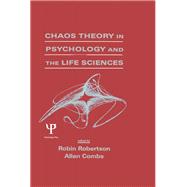
Note: Supplemental materials are not guaranteed with Rental or Used book purchases.
Purchase Benefits
What is included with this book?
| Foreword | p. ix |
| References | p. xi |
| Introduction to Chaos Theory | p. 1 |
| Chaos Theory and the Relationship between Psychology and Science | p. 3 |
| Chaos, Evolution, and Deep Ecology | p. 17 |
| The Tower of Babel in Nonlinear Dynamics: toward the Clarification of Terms | p. 39 |
| Research Methods and Chaos Theory | p. 49 |
| The Nostril Cycle: a Study in the Methodology of Chaos Science | p. 51 |
| Constraint, Complexity, and Chaos: a Methodological Follow-Up on the Nostril Cycle | p. 61 |
| Anger, Fear, Depression, and Crime: Physiological and Psychological Studies Using the Process Method | p. 65 |
| Is There Evidence for Chaos in the Human Central Nervous System? | p. 89 |
| Cognition and Chaos Theory | p. 101 |
| Naturally Occurring Computational Systems | p. 103 |
| Belief Systems as Attractors | p. 123 |
| A Cognitive Law of Motion | p. 135 |
| Dynamics, Bifurcation, Self-Organization, Chaos, Mind, Conflict, Insensitivity to Initial Conditions, Time, Unification, Diversity, Free Will, and Social Responsibility | p. 155 |
| Education, Social Science and Chaos Theory | p. 175 |
| Chaos, Creativity, and Innovation: toward a Dynamical Model of Problem Solving | p. 179 |
| Fractals and Path-Dependent Processes: a Theoretical Approach for Characterizing Emergency Medical Responses to Major Disasters | p. 199 |
| Chaos Theory and Social Dynamics: Foundations of Postmodern Social Science | p. 217 |
| Psychotherapy and Chaos Theory | p. 235 |
| Unbalancing Psychoanalytic Theory: Moving beyond the Equilibrium Model of Freud's Thought | p. 239 |
| Chaotic Phenomena in Psychophysiological Self-Regulation | p. 253 |
| Strange Attractors in Patterns of Family Interaction | p. 267 |
| The Fractal Geometry of Human Nature | p. 275 |
| The Princess and the Swineherd: Applications of Chaos Theory to Psychodynamics | p. 285 |
| Regression as Chaotic Uncertainty and Transformation | p. 295 |
| Philosophy and Chaos Theory | p. 305 |
| Chaos, Psychology, and Spirituality | p. 309 |
| Cross-Cultural Chaos | p. 319 |
| Emergence in Neurological Positivism and the Algorithm of Number in Analytical Psychology | p. 331 |
| References | p. 342 |
| How Predictable Is the Future? the Conflict between Traditional Chaos Theory and the Psychology of Prediction, and the Challenge for Chaos Psychology | p. 345 |
| Chaos: the Geometrization of Thought | p. 359 |
| Biographies of Authors | p. 373 |
| Author Index | p. 379 |
| Subject Index | p. 389 |
| Table of Contents provided by Publisher. All Rights Reserved. |
The New copy of this book will include any supplemental materials advertised. Please check the title of the book to determine if it should include any access cards, study guides, lab manuals, CDs, etc.
The Used, Rental and eBook copies of this book are not guaranteed to include any supplemental materials. Typically, only the book itself is included. This is true even if the title states it includes any access cards, study guides, lab manuals, CDs, etc.